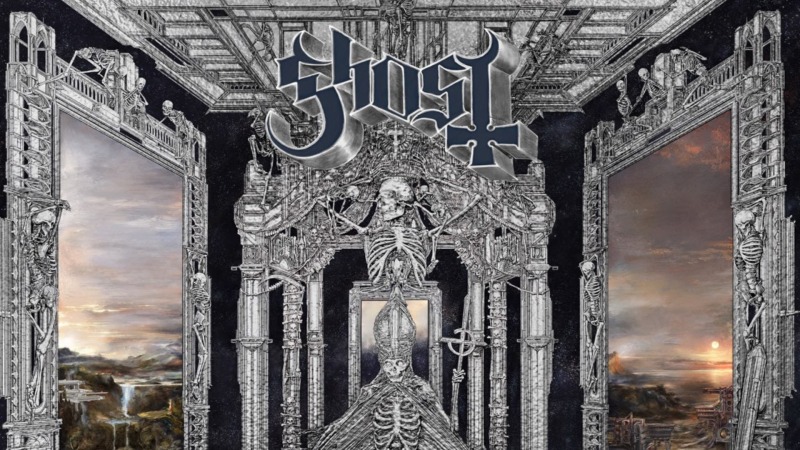Ghost Revel in Powerful Contrast on Skeletá
Sweden’s kings of Satanist-forward metal-cum-arena rock capture the sound of an entire musical genre rooted in a hyper-specific era of its development on their sixth record.

Imagine digging through the box of old vinyls your dad has stashed in his attic, lovingly bulwarked from time’s ravages by the folds of a dust cover. Imagine, as you flip, flip, flip past one record to the next, stopping on one emblazoned by an ornate osseous painting, a man’s bones topped with a mitre at the image’s center. “This,” you say to yourself, “is a telltale sign of 1980s progressive metal, if ever I saw such a thing.” You’re technically right and strictly wrong at the same time; the album is Skeletá, the band is Ghost, and the year is 2025.
Ghost, Sweden’s kings of Satanist-forward metal-cum-arena rock, capture the sound of an entire musical genre rooted in a hyper-specific era of its development on their sixth record, or “psalm,” per the band’s preferred stylization. There are those in the world folks like to refer to as “old souls”; Skeletá is the LP equivalent to that characterization, an anachronistically fresh piece of work that mimics the aspirant, rebellious spirit of wild, bygone years of bad hair, terrible politics, and even worse economic policies. The kicker is that Ghost have only been making music that rings of Satanic praise in the ears of the ignorant, and as cultural criticism of man’s prevailing fears over life and death to more curious listeners, for about 15 years. Their work wasn’t even seeded in the 1990s.
That’s the pleasure, of course, of Ghost, whose music foundationally reads as a product of bygone decades, as well as Skeletá. But Skeletá comes packaged with pleasures of its own too, specific to its placement in the band’s discography: As a later-stage release in their career, the psalm expresses a depth of introspection, not a trait typically associated with the macabre, fine-honed aesthetic Ghost have hung their hat on since October, 2010. (For clarity’s sake: Ghost formed in 2006, but played live for the first time at the Hammer of Doom Festival in Würzburg, Germany, on October 23rd, 2010.) The focal shift towards interior concerns may be a consequence of its recent change in leadership. Gone is Papa Emeritus IV, succeeded by the new guy, Papa V Perpetua; if Ghost’s sound mellows on Skeletá, it could be subsequent to Perpetua’s ascension. (Should none of this make sense to you, here are the broad strokes: Ghost frontman Tobias Forge periodically updates his stage personas. Papa Emeritus IV was his most recent; Perpetua is his latest.)
-

-

-

-

-

-

-

-

-

-

-

-

-

-

-

-

-

-

-

-

-

-

-

-

-

-

-

-

-

-

-

-

-

-

-

-

-

-

-

-








































